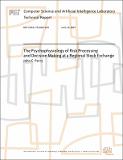The Psychophysiology of Risk Processing and Decision Making at a Regional Stock Exchange
Author(s)
Perry, John C.
DownloadMIT-CSAIL-TR-2007-033.ps (15.65Mb)
Additional downloads
Other Contributors
Clinical Decision-Making
Advisor
Peter Szolovits
Metadata
Show full item recordAbstract
A longstanding controversy in philosophy is whether decision-making isgoverned by reason or emotion. I study the role of physiologicalresponses in the decision-making process within the realm of financialmarkets, where both the environment and decisions---trades---aremeasurable.In an experiment performed on a regional stock exchange, mycollaborators and I record six different types of physiologicalsignals---skin conductance/galvanic skin response (SCR/GSR), bloodvolume pulse (BVP), electrocardiogram (ECG),electroencephalogram (EEG), electromyogram (EMG), andtemperature (Temp)---of monetarily motivated professionals making highpressure decisions. From these signals I estimate underlyingphysiological features, such as heart rate,changes in body temperature, and amplitude of SCR, which are proxy foraffect. Simultaneously, we record real-time market information whichthe specialists process and which serves as the basis for theirdecisions, as well as recording their decisions and outcomes.In a sample of eight market-makers, I find statistically significantdifferences in mean skin conductance response and cardiovascularvariables during transient market events relative to no-market-eventcontrol intervals. In addition, I find a strong relationship betweentrading decisions and physiological responses. Using regression, Idemonstrate that heart rate variability can statisticallysignificantly improve predictions of trading decisions, although notby much.
Description
PhD thesis
Date issued
2007-06-12Other identifiers
MIT-CSAIL-TR-2007-033
Series/Report no.
Massachusetts Institute of Technology Computer Science and Artificial Intelligence Laboratory